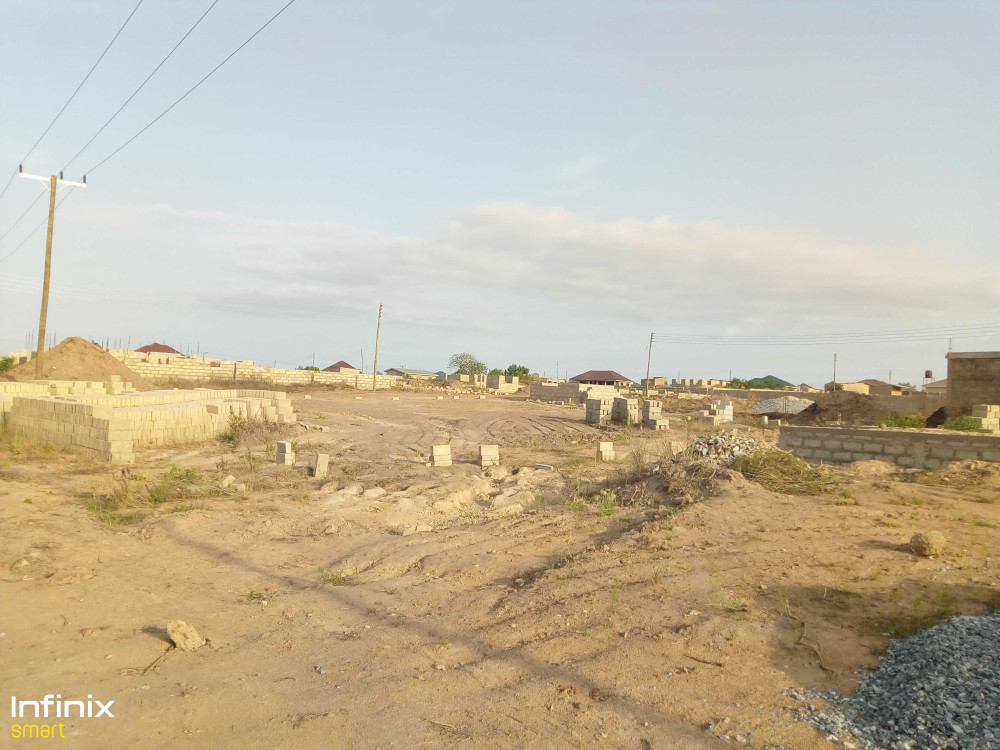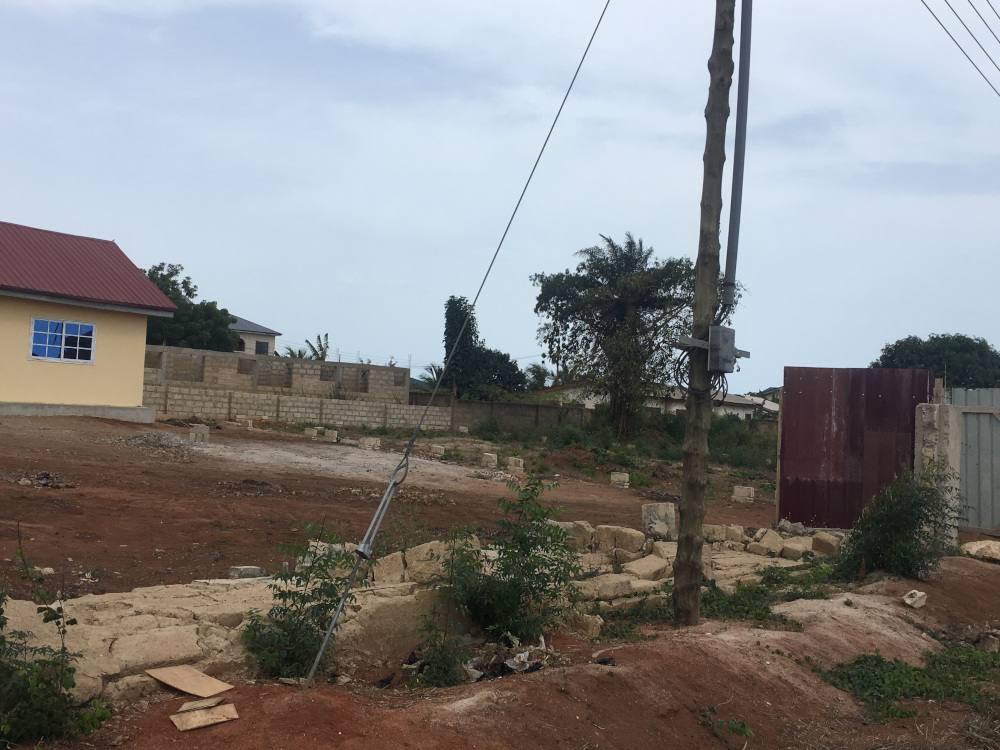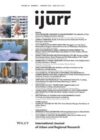Land commodification has reached an alarming scale in Ghana. A World Bank report in 2015 revealed that the cost of land in major cities in Ghana, including Accra, the country’s capital ‘increased by between 460% and 1,300% from 1995 to 2005’. A more recent report also revealed that the value of land in the Greater Accra Metropolitan Area (GAMA) had increased by 450% over the past 13 years (2005 – 2018) (Citinewsroom, 2018). It is worth mentioning that land commodification, which constitutes the process in which land acquires an economic value to become a commodity, is not new in Ghana given its footprints in colonial ordinances (Sackeyfio, 2012). What is new in recent times, however, is the overwhelming growth in commodification and its implications for tenure security in Accra’s peri-urban areas.
In this Spotlight On essay, I draw on my research on land conflicts and housing development in peri-urban Accra to contend that rising commodification, coupled with land administration challenges, is producing alternative forms of tenure security. These alternative tenure security forms include the reliance on past narratives, rapid land transfer for development, and the hiring of extra-legal groups known as ‘landguards’. Examining these changes in the peri-urban land market has become important following the competing interests of these alternative tenure security forms against formal land title acquisition in the protection of land. More significantly, the focus on the growing commodification and how this creates alternative tenure securities offers a different perspective on the implications of land commodification in sub-Saharan Africa (SSA), which has largely focused on the widespread opportunities for access to land, particularly for women, and the dispossession of people on land through land grabbing and land-use change (Jayne et al., 2021; Holden and Tilahun, 2021; Chimhowu, 2019; Amanor 2018; 2012; Ubink, 2008).
The growth in land commodification in sub-Saharan African cities reflects the increasing urban population, growing housing demand, rising income and wealth, and evolving land administration practices (Jayne et al., 2021; Chimhowu, 2019). In peri-urban Accra for instance, the high cost of rent, rapid urbanization, and the soaring housing deficit of 2 million units across the country (Citifmonline, 2019), is compelling many people to acquire land in peri-urban areas to build. The snapshot in Figure 1 shows the everyday activities of land transactions for housing development in peri-urban Accra. This increase in demand for land, coupled with the everyday land transaction which underpins rising commodification, is fraught with complex power relations and land administration problems. Ehwi et al (2019) classify these land administration problems to include unguided land acquisition practices, ineffective land registration practices and unreliable land tenure security arrangements. Consequently, it has become very important to investigate how land commodification and the related land administration problems are increasingly informing new forms of tenure security despite the existence of formal tenure in the form of title acquisition. The focus on peri-urban Accra brings to the fore an attempt to understand how growing commodification is shaping and redefining tenure security in a space with a dual identity; that is, the peri-urban as a centre for new developments and opportunities (Bartels, 2019; OECD, 1978) and at the same time, a space of property contentions and uncertainties (Asafo, 2020; Ubink, 2008).

Figure 1: Demarcation of land for housing development in peri-urban Accra. Photo: Divine Asafo, 2018.
Commodification and alternative forms of land tenure security in peri-urban Accra.
In sub-Saharan Africa, including in Accra, past decades have seen significant transformation in customary land administration, including tenure formalization which is considered as an effective panacea to tenure uncertainties (Chimhowu, 2019; Durand Lasserve and Serod, 2007; De Soto, 2000). This tenure formalization has arguably increased across sub-Saharan Africa due to the growing commodification of land and the case of peri-urban Accra demonstrates similar trends. However, the growing commodification, coupled with land administration problems in Accra, has become a catalyst for the reliance on past narratives to secure contested land. The narratives, based on either historical events or traditions (Kansanga et al, 2019; Lund, 2013), passed down to land sellers in peri-urban Accra by their predecessors, are perceived as tools for enacting power and control over contested land. Evidence from my research reveals that these largely oral narratives focus on land ownership and boundaries which were once identified by landmarks such as anthills, rivers, and boundary trees, but have disappeared due to rapid development. Evoking these past narratives as tools for land claims does not necessarily imply acknowledging history; rather it means taking advantage of the past as a solution to current circumstances, in this case, contentions over land ownership by multiple land owners (Benjamin, 1968 cited in Bohn, 2019). The reliance on these past narratives emanates from most land seller’s disregard for land titles which are considered as necessary but insufficient tools for land control. Put differently, land titles are regarded as the ultimate tools for land security in theory, however, this is far from reality, as most land sellers with land titles in peri-urban Accra are engaged in endless competing claims over land. Besides, institutional corruption and bureaucratic hurdles that characterize land title registration force an over-reliance on past narratives as alternative forms of land protection.
It is worth noting that these past narratives are embedded in complex, uneven power and social relations. That is, given that much of the land in peri-urban Accra is controlled by chiefs, families and clans (customary institutions), the framing of these past narratives is inextricably related to persons with varying degrees of influence and power. With insight from my research, these powers and influences originate from at least three sources: the first is attributed to economic power where some land sellers complement their past narratives with their wealth to gain access and maintain control over land. The second involves some land sellers relying on older family members who, due to their age and experiences, are assumed to have accurate information about the history of land ownership. The third involves some sellers relying on their strong social networks with government institutions to increase their chances of having their land legitimized. Consequently, the ability to gain access and maintain control over contested land is dependent on the highest bidder who combines economic power, family relations and social networks. This development is consistent with Ribot and Peluso’s (2003) access theory which contends that several factors inform access, control and use of resources other than just property rights, in this case land titles. Beyond these, the power and social relations coupled with past narratives reflect the fluidity of the social structures that constitute customary land in peri-urban Accra and by extension, in sub-Saharan Africa (Leduka, 2006; Rakodi, 2006).
Another alternative form of tenure security practice advanced by most land sellers in peri-urban Accra is rapid land transfer for development. This deliberate practice results from rising demand and growing commodification which outweigh the desire and process to formalize tenure. Empirical findings from my research suggests that large parcels of land in peri-urban Accra are not formally registered due to complex land conflicts. Consequently, most land sellers rapidly sell the land to developers to make profit but more importantly, to secure tenure. Securing tenure through this practice is induced by land sellers encouraging developers to rapidly build their houses or erect a temporary structure on the land. This act primarily serves to publicize the presence of ownership of the land on behalf of both the land seller and the developer. The adoption of this tenure security approach by most land sellers resonates with existing debates that hiring of caretakers and erecting of physical structures in securing land is more reliable than formal titles (Amanor, 2006; Ehwi and Asafo, 2021; Asafo, 2020). The ineffective collaboration between state and customary institutions exacerbates the failure of land titles in land protection. This is evident in the late arrival of municipal authorities and their imposition of formal spatial planning regulations on land that has already been developed (Wehrmann, 2008; Asafo, 2020). A case in point is municipal authorities rezoning areas as roads or utility plots despite the land being fully developed. In most cases, some land sellers who already possess land titles to these rezone areas feel disappointed that the land is not protected after all. This lack of coordination in managing peri-urban land in Accra is attributed to the overlapping responsibilities of the state and customary institutions in managing land (See Wehrmann, 2008).
The rapid development and growing commodification of the land market in sub-Saharan Africa has seen the emergence of new and different actors, including land brokers, private developers and real estate companies, whose interests do not necessarily reveal their immediate benefits, but rather their long-term interests shaped by everyday land politics (Asafo, 2020; Lombard, 2016). In peri-urban Accra however, the rise of landguards or ‘landguardism’ constitutes a distinctive feature of new actors in the land market. Landguardism is defined as the hiring of a group of young people who use illegitimate forces in land protection in return for remuneration in kind, or cash (Ehwi and Asafo, 2021; Darkwa and Attuquayefio, 2012). The primary aim of this extra-legal group is to offer protection on contested land to their clients, that is, land sellers. The widespread and increasing reliance on landguards, according to land sellers, stems from their cheap and reliable services which land titles and security agencies, such as the Police, cannot provide in land conflict situations (Ehwi and Asafo, 2021; Darkwa and Attuquayefio, 2012; Bansah, 2017). Accordingly, their services offer effective security for land following their vicious activities involving threats and assault on land sellers and developers (sometimes causing death), and the demolition of housing structures and fence walls (See arrow in Figure 2). Nonetheless, this has proven to be unsustainable. The Government of Ghana has since banned landguardism through the Vigilante and Related Offences Act, 2019 – Act 999, however, the practice continues to thrive covertly, creating complex land conflicts in the peri-urban land market in Accra.

Figure 2: A fence wall pulled down by landguards in peri-urban Accra (Achiaman). Photo: Divine Asafo, 2018.
Land conflicts in sub-Saharan Africa are caused by multiple factors, including ineffective institutions, increasing commodification, rising demand for land and multiple land sales (Wehrmann, 2008). In the peri-urban land market in Accra, however, alternative forms of tenure security constitute a major trigger of land conflicts between land sellers. These land conflicts, defined as the competitive struggle over land by different land sellers with competing interests over a time (Asafo, 2020) arise from the informal and unstandardized practice that characterize these alternative tenure security forms. A distinct feature of these land conflicts is that they are largely considered as civil cases due to their origin and the parties involved. However, landguardism for instance has introduced a criminal dimension to these conflicts, resulting in more complex tenure insecurities. A more troubling situation characterizing these land conflicts is that they do not necessarily get resolved; rather their intensity decreases with time. Regardless, in situations where either of the competing parties gathers resources such as finance and new evidence in the form of past narratives and networks, such conflicts reignite, leading to endless uncertainties. Furthermore, much as peri-urban spaces shift to undeveloped areas over time, the land is always open to contestations because its associated uncertainties cannot be simply settled with land titles. This situation is akin to the landguardism which also evolves, hence land conflicts and landguardism move in tandem.
In conclusion, there is no doubt that growing commodification has resulted in transformations in the peri-urban land market in Accra. Particularly, the growing disdain for land titles and the adoption of alternative tenure security has become a significant feature of the peri-urban land market. Although these alternative tenure security forms are not legally recognized, they are socially accepted because they are embedded in past and present Ghanaian socio-economic and cultural practices. A foreseeable problem with this development is that the continuous reliance on these alternative tenure security forms, following increased land demand and commodification, would produce fragile, insecure and volatile peri-urban spaces where existing and imminent developments, such as housing, would become susceptible to threats of future demolitions. Importantly, relying on these alternative tenure security forms poses the bigger threat of eroding the gains of tenure formalization which has characterized customary land in Ghana and by extension sub-Saharan Africa over the past decades. Against this background, there is the need for both the state and customary institutions in SSA to collaborate effectively to ensure tenure formalization processes are more robust and effective. Importantly, equipping land registration institutions with modern approaches to land administration such as the digitization of land administration systems in Ghana would ensure efficiency and transparency in tenure formalization processes. This will ensure that peri-urbanisation does not create spaces of despair, where conflicts impede spatial and economic developments.
Divine Asafo (Twitter) is a Lecturer in Human Geography at the University of Hull. He is also a member of the Young Person Advisory Group (YPAG) of the British Academy Youth Futures Project- Promoting sustainable livelihoods: unpacking possibilities for empowerment with young migrants in Ghana. His research interests are within the intersection of peri-urban development, land conflicts, housing and urban disaster risks.
All essays on African Futures
Introduction: Africa’s Urban Futures
Claire Mercer
City of the Future: Lagos and the Afropolitan Imagineering Project of Owambe Urbanism
Grace Adeniyi-Ogunyankin
‘Colour Ni Green’: Ecological Futures in Nairobi Outlaw Style
Wangui Kimari
Aesthetics and the Making of Urban Futures in Luanda, Angola
Claudia Gastrow
Appropriating and Contesting Digital Infrastructural Futures in Urban Africa
Prince K Guma
Land Commodification and Tenure (In)Security: Spotlight on Peri-urban Accra, Ghana’
Divine Asafo
Centring the ‘Urban State’ in African Urban Governance Debates
Liza Rose Cirolia
Published online November 2022
Related IJURR articles on African Futures
A Shadowy ‘City of Light’: Private Urbanism, Large-Scale Land Acquisition and Dispossession in Ghana
Austin Dziwornu Ablo, & Bjørn Enge Bertelsen
Conceptualizing African Urban Peripheries
Paula Meth, Tom Goodfellow, Alison Todes & Sarah Charlton
Cities, Creativities and Urban Creative Economies: Re‐descriptions and Make+Shifts from Sub‐Saharan Africa
Jenny Mbaye & Andy C Pratt
Identity Building Through Mediation by African Tailors
Sofia Vilarinho & Henri Christiaans
Infrastructure Disruption in ‘Silicon Savannah’: Exploring the Idea of the Creative Class and their Relation to Quality of Place in Nairobi, Kenya
Lauren Rosenberg & Alan Brent
The Creative Night‐Time Leisure Economy of Informal Drinking Venues
Andrew Charman & Thiresh Govender
The Green Masterplan: Crisis, State Transition and Urban Transformation in Post‐Genocide Rwanda
Shakirah Esmail Hudani
The Real Estate Frontier
Tom Gillespie
Day Zero and The Infrastructures of Climate Change: Water Governance, Inequality, and Infrastructural Politics in Cape Town’s Water Crisis
Nate Millington and Suraya Scheba
Urban States: The Presidency and Planning in Luanda, Angola
Claudia Gastrow
Forefronts of the Sharing Economy: Uber in Cape Town
Andrea Pollio
‘The City of Our Dream’: Owambe Urbanism and Low‐income Women’s Resistance in Ibadan, Nigeria
Grace Adeniyi Ogunyankin
Boundary Work: Becoming Middle Class in Suburban Dar es Salaam
Claire Mercer
Silence and Voice in Nigeria’s Hybrid Urban Water Markets: Implications for Local Governance of Public Goods
Charisma Shonté Acey
Global Urban Policymaking in Africa: A View from Angola Through the Redevelopment of the Bay of Luanda
Sylvia Croese
Urban Fortunes and Skeleton Cityscapes: Real Estate and Late Urbanization in Kigali and Addis Ababa
Tom Goodfellow
Sisyphean Dilemmas of Development: Contrasting Urban Infrastructure and Fiscal Policy Trends in Maputo, Mozambique
Gabriella Y. Carolini
Idioms of Accumulation: Corporate Accumulation by Dispossession in Urban Zimbabwe
Beacon Mbiba
‘No Condition is Permanent’: Informal Transport Workers and Labour Precarity in Africa’s Largest City
Daniel E Agbiboa
Building God’s City: The Political Economy of Prayer Camps in Nigeria
Asonzeh Ukah
© 2022 THE AUTHOR. INTERNATIONAL JOURNAL OF URBAN AND REGIONAL RESEARCH, PUBLISHED BY JOHN WILEY & SONS LTD UNDER LICENSE BY URBAN RESEARCH PUBLICATIONS LIMITED
This is an open access article under the terms of the Creative Commons Attribution-NonCommercial-NoDerivs License, which permits use and distribution in any medium, provided the original work is properly cited, the use is non-commercial and no modifications or adaptations are made.
